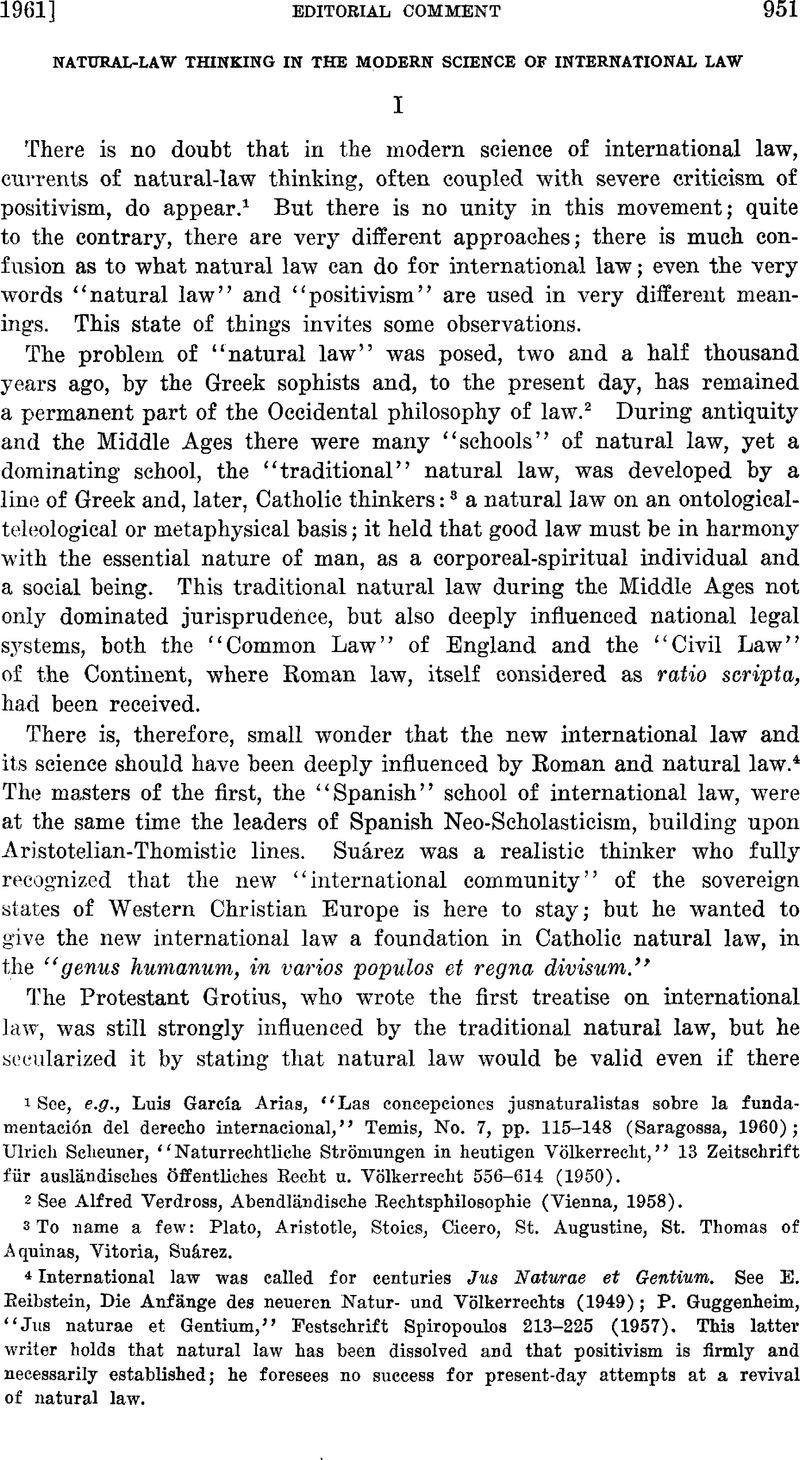Published online by Cambridge University Press: 28 March 2017

1 See, e.g., Arias, Luis Garcia, “Las concepciones jusnaturalistas sobre la funda-mentación del derecho internacional,” Temis, No. 7, pp. 115-148 (Saragossa, 1960)Google Scholar; Scħeuner, Ulrich, “Naturrechtliclie Strömungen in heutigen Völkerrecht,” 13 Zeitschrift für ausländisches öffentliches Recht u. Völkerrecht 556-614 (1950)Google Scholar.
2 See Alfred Verdross, Abendländische Rechtsphilosophie (Vienna, 1958).
3 To name a few: Plato, Aristotle, Stoics, Cicero, St. Augustine, St. Thomas of Aquinas, Vitoria, Suárez.
4 International law was called for centuries Jus Naturae et Gentium. See E. Reibstein, Die Anfänge des neueren Natur- und Völkerrechts (1949) ; P. Guggenheim, “Jus naturae et Gentium,” Pestschrift Spiropoulos 213-225 (1957). This latter writer holds that natural law has been dissolved and that positivism is firmly and necessarily established; he foresees no success for present-day attempts at a revival of natural law.
5 Thus, Oppenheim-Lauterpacht, International Law. A Treatise, Vol. I, Peace 93 (8th ed., 1955), holds that the hulk of Grotius’ interest was in the natural law of nations; exactly to the contrary, Guggenheim, loc. cit. note 4 above, at 233.
6 Particularly Johann Jacob Moser.
7 Particularly Samuel Pufendorf.
8 Brierly, J. L., The Law of Nations 39 (4th ed., 1949)Google Scholar.
9 Except Spain, where Krause’s philosophy dominated—”el krausismo español.”
10 Bergbohm (Jurisprudenz und Eechtsphilosophie, 1892) declared natural law dead.
11 Charmont, La renaissance du droit naturel (1910) ; Keller, Droit naturel et droit positif en droit international public (1931); Haines, The Bevival of Natural Law Concepts (1939).
12 Die ewige Wiederkehr des Naturrechts (1949).
13 Naturrecht (1950).
14 Helmut Coing, Die obersten Grundsätze des Eechts (1947).
15 Cairns (Legal Philosophies from Plato to Hegel 113 (1949)) states that “Pound’s ‘postulates of civilized society in our time and place’ are really natural law doctrines intentionally framed as the necessary presuppositions of a particular system or systems. ‘ ‘
16 “The term natural law is fashionable, especially among Catholics who seek a rallying point against relativism. There are, therefore, many people using it, and they bring it up on any pretext, as other men use the term sociology.” J. Leclerq, in 2 Natural Law Forum 64 (1957).
17 On his “objective theory” see Garcia Arias, loc. oit. note 1 above, at 140-143.
18 La société internationale et les principes du droit international public (1927).
19 Verdross, A., Völkerrecht 55 (4th ed., 1959)CrossRefGoogle Scholar.
20 An International Bill of the Rights of Man (1945).
21 Oppenheim-Lauterpacht, op. cit. note 5 above, at 107.
22 Derecho Internacional Público (1952-1954).
23 Op. cit. note 8 above, at 57.
24 Theory and Reality in Public International Law (1957). See this writer’s book review in 70 Harvard Law Rev. 1331-1336 (1957).
25 Les nouvelles tendances du droit international (1926).
2 Krabbe, H., “L’idée moderne de l’État,” 13 Hague Academy Keceuil des Cours (1920, III)Google Scholar.
27 H. Drost, Grundlagen des Völkerrechts (1936).
28 Franz W. Jerusalem, Kritik der Eechtswissenschaft 5 (1948).
29 The leading sociological jurist of Brazil, Pontes de Miranda, wants to determine justice positivistically and scientifically; he asks for “a justiça concreta, verificável e conferível com о fato.” 1 Sistema de Ciencia Positiva do Diretto 477 (1922).
30 F. S. C Northrop, The Complexity of Legal and Ethical Experience (1959).
31 See his dissenting opinions as a judge of the International Court of Justice at The Hague, and his last two books: Le Droit International Nouveau dans ses Rapports avec la Vie Actuelle des Peuples (1959), and Le Droit International Nouveau. Son Acceptation, Son Étude (1960).
32 See, on this problem, Brecht, A., Political Theory. The Foundation of Twentieth Century Political Thought (1959)CrossRefGoogle Scholar, and the article by Means, A. Jr., “Legal Theory and Arnold Brecht,” 47 Virginia Law Rev. 264-276 (1961)CrossRefGoogle Scholar.
33 See his study in 8 österr. Zeitschr. f. Off. Recht 1-26 (1957).
34 See, e.g., O’Meara, Joseph, “Natural law fruitfully may be regarded as the contribution which ethics can make to law,” 5 Natural Law Forum 83 (1960)Google Scholar; A. Utz, “Natural law is essentially normative ethics,” 3 ibid. 170 (1958).
35 Jean Dabin, Theorie Générale du Droit 324 (2nd ed., 1953),